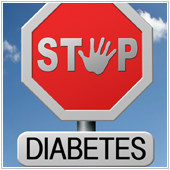 Diabetes is a group of diseases characterized by high blood glucose levels resulting from the body’s inability to properly produce and/or use insulin. You’ve definitely heard of it before, but you probably don’t realize quite how prevalent it is. The numbers are staggering!
Diabetes is a group of diseases characterized by high blood glucose levels resulting from the body’s inability to properly produce and/or use insulin. You’ve definitely heard of it before, but you probably don’t realize quite how prevalent it is. The numbers are staggering!
The American Diabetes Association has designated the month of November, American Diabetes Month, to raise awareness related to the management, consequences and prevention of type 2 diabetes.
Frightening Facts
About 26 million children and adults in the United States have diabetes and another 79 million have prediabetes. With numbers like that, you’re sure to know someone that’s affected, even if you aren’t aware of who it is.
The Centers for Disease Control and Prevention released statistics showing that the number of Americans diagnosed with diabetes more than tripled between 1980 and 2011, rising from 5.6 million to 20.9 million. What’s more, projections from the American Diabetes Association show that by the year 2050, one in three American adults will have the disease. Without a doubt, the frightening statistics show that diabetes is something we cannot ignore.
-
The national cost of diagnosed diabetes in the United States is $245 billion.
-
Two out of three people with diabetes die from heart disease or stroke.
-
People with diabetes have 10 times higher chances of amputation.
-
Diabetes is the leading cause of kidney failure and new cases of blindness among adults.
According to the International Diabetes Federation, there are three main types of diabetes. Type 1 diabetes is also known as juvenile-onset diabetes and is usually developed in children and young adults. People with type 1 diabetes need an injection of insulin every day to keep them alive. Type 2 diabetes accounts for about 90% of all cases of diabetes and is often associated with obesity. The third type of diabetes is Gestational diabetes, which develops in one of 25 pregnancies worldwide.
Take Action
While professionals are currently unable to find effective prevention methods for type 1 diabetes, evidence supports the following steps to prevent or delay the onset of the more prevalent type 2 diabetes.
-
Lose weight. Studies show that losing 5 to 7 percent of your total body weight and maintaining the loss can reduce the chances of developing diabetes.
-
Increase physical activity. This element helps initiate and maintain weight loss. It also increases insulin sensitivity, reduces blood pressure and assists with psychological well-being. Exercising fewer than three times a week is a well- known risk factor for diabetes.
-
Don’t smoke. Smoking increases abdominal fat accumulation and insulin resistance. Smoking is a well-known risk factor for many diseases, including diabetes.
-
Take care of yourself. Enjoy a balanced and nutritious diet, maintain healthy cholesterol and blood pressure levels and make an effort to get adequate sleep each night. Living with stress and depression, as well as sleep deprivation are associated with a higher risk of diabetes.
If you have a family history of diabetes, you are at a higher risk. Also, certain ethnicities are more susceptible to this disease than others. While the onset of type 1 diabetes is usually dramatic and sudden, type 2 diabetes is more subtle and difficult to detect. Some of the symptoms may include:
-
Weight loss
-
Excessive tiredness
-
Frequent need to urinate
-
Excessive thirst
-
Blurred vision
-
Slow-healing wounds
If you experience any of these symptoms, it’s best to discuss them with a health professional sooner rather than later. Anyone older than age 45 should receive blood sugar screenings every three years.
Whether you think you’re at risk or not, it’s important to be aware of the ways you can decrease your chances of developing this disease. That’s why it’s critical to discuss healthy habits like diet and exercise with children and other family members. If you have any questions about risk factors, prevention methods or symptoms, please don’t hesitate to visit your neighborhood healthcare experts at [company_short] or give us a call at [phone_main].